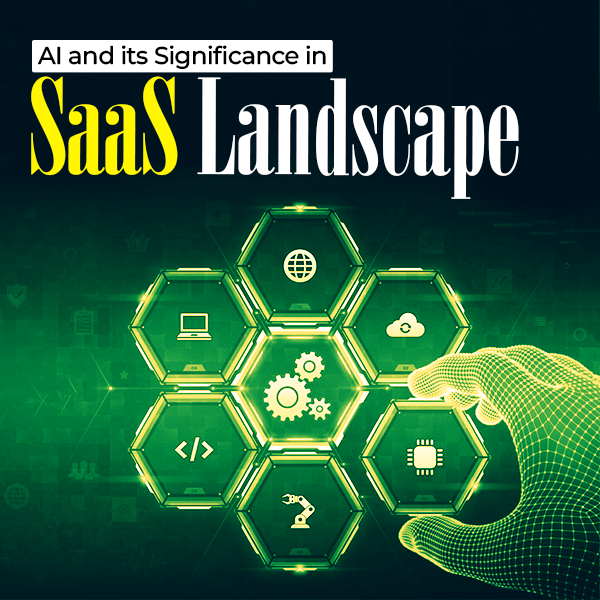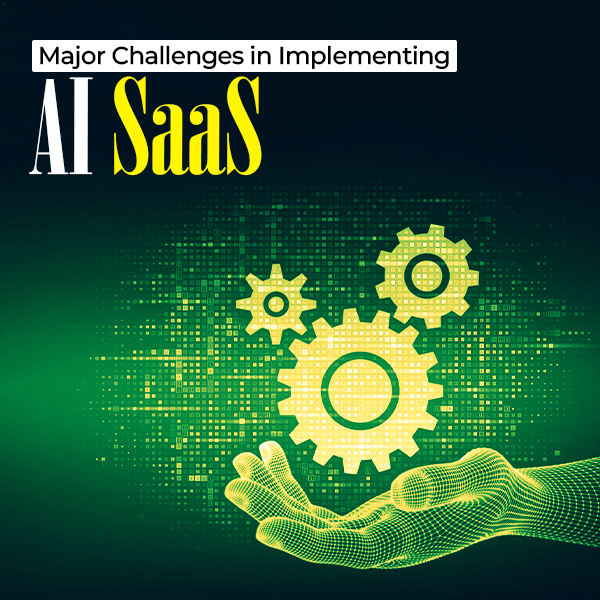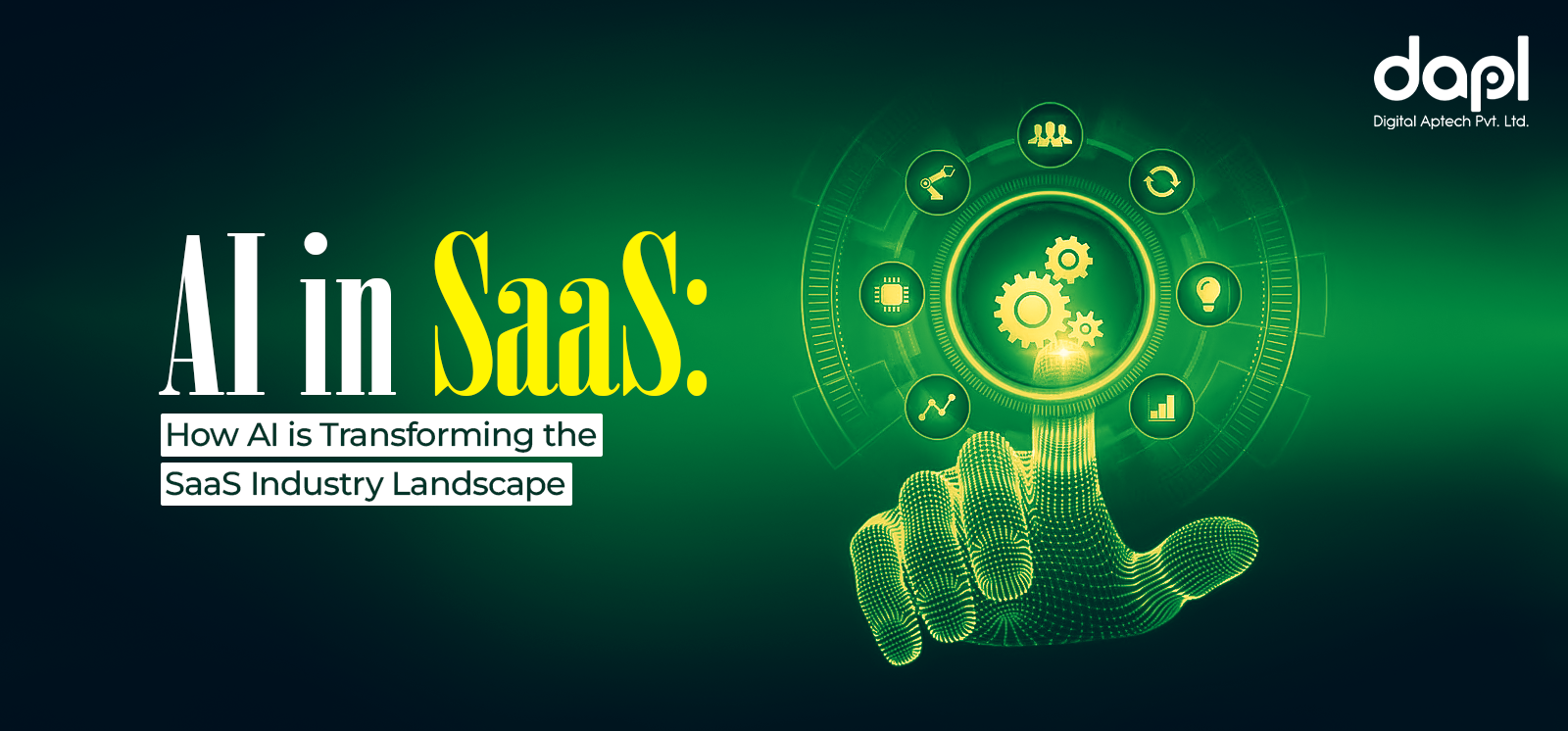Artificial Intelligence is transforming the Software-as-a-Service landscape empowering brands to deliver personalized and intelligent solutions. From automation and hyper-personalization to improved data security and smart analytics, AI is proving to be a game-changer for SaaS companies to foster innovation, customer satisfaction, efficiency and competitive edge.
Do you have a SaaS-based business that you aim to transform with AI integration? Here we have provided a detailed rundown on AI in SaaS, its significance, challenges, solutions and more.
A Brief Overview: AI in SaaS
AI SaaS refers to AI-powered tools that empower cloud-based solution providers to implement AI services and solutions seamlessly. Such AI solutions are highly cost-effective compared to developing in-house AI systems. SaaS Artificial Intelligence enables faster development, improved customer journeys, data-driven decision-making and sustainable brand growth.
Experts believe the best solution to unleash AI’s maximum potential is to pair it with the cloud. AI SaaS has been witnessing rapid adoption in the past few years and is gaining traction in fintech, healthcare, logistics, retail, and hospitality. If recent reports and statistics are to be believed, the business outcomes are exceptional.
AI and its Significance in SaaS Landscape

Utilizing AI capabilities in SaaS can boost a brand’s ability to derive actionable intelligence, automate tasks, reduce operational costs, enhance customer journey and more. Let’s explore how AI in SaaS can contribute to the rapidly-evolving tech landscape.
Smarter Decision-making Powered by Data: SaaS applications are designed to handle massive sets of data. AI integration will act as a catalyst to further amplify it effectively. From pricing strategy optimization to predicting customer behavior and providing hyper-personalized experiences, AI-powered SaaS tools are equipped to analyze vast data sets to assist in smarter decision-making.
Improved Productivity: SaaS applications when combined with AI capabilities can revolutionize how businesses operate. With automation, predictive analytics and virtual customer assistants, businesses are equipped to simplify tasks and streamline overall operations, allowing for efficient resource allocation for high-value tasks and core business activities.
Strategic Marketing: AI SaaS presents itself as an excellent tool for marketing efforts. AI algorithms when incorporated into promoting a business work more effectively and accurately compared to conventional marketing techniques. AI algorithms can analyze customer behavior and help curate personalized and targeted marketing campaigns leading to optimal effectiveness and better ROI.
Exceptional Customer Satisfaction: Customer service and satisfaction are other key areas where brands can leverage AI and SaaS. Virtual assistants and AI-powered chatbots can empower brands to provide 24/7 support, prompt and efficient resolution of issues and highly personalized consumer experiences. This will assist in boosting customer engagement, loyalty, retention and improved brand reputation.
Superior User Experience: Much of the success of modern businesses depends on the level of user experience that a brand offers. AI-powered SaaS solutions help deliver personalized experiences that are also highly adaptive. Brands can tweak, tailor and optimize the design and content of the software products offered to enhance user experience.
Major Challenges in Implementing AI SaaS

While AI integration to SaaS applications offers a multitude of advantages, there are certain key pitfalls that brands should consider to ensure smooth integration and assured success. These are the significant challenges brands need to focus on when planning to opt for AI SaaS:
Data Privacy: Managing vast volumes of sensitive data sets, particularly from healthcare or the financial sector, needed for training AI systems, raises possible concerns about data integrity and safety.
Bias: Bias present in the data used to train AI modules and algorithms can potentially appear in the results leading to discriminatory outcomes. This might lead to ethical concerns, reputation damage or loss of revenue.
Regulatory Compliance: Industry compliance and regulation standards are evolving keeping pace with rapid development in the AI landscape. Businesses need to be aware of updated regulations for AI SaaS to avoid legal complications and penalties.
Navigating the AI SaaS Landscape with a Reliable Partner
As SaaS and AI come together, there are endless possibilities for businesses aiming to scale up. Whether you are looking to develop a new software application, revamp a website or build a new one, AI SaaS integration can be a key tool ensuring success, efficiency and cost-effectiveness.
Get AI-powered SaaS solutions curated specifically to meet evolving brand needs. Collaborate with a team of experts with decade-old collective expertise and experience in developing GDPR-compliant software solutions.




